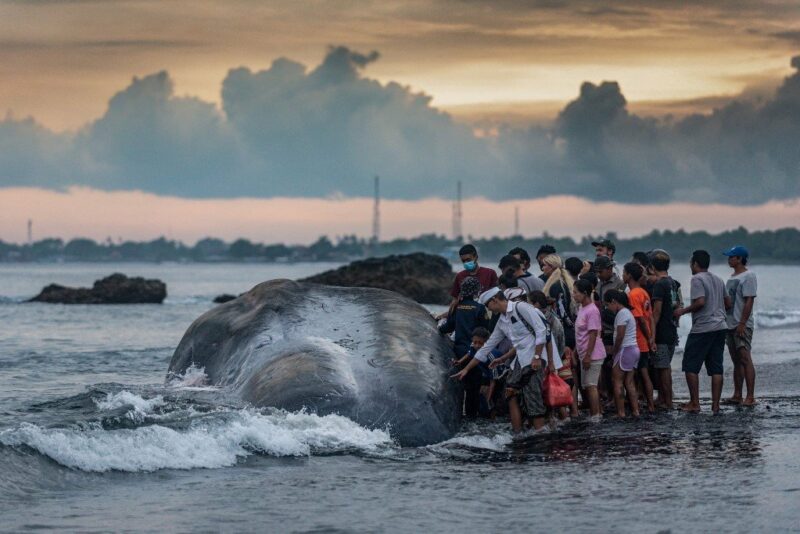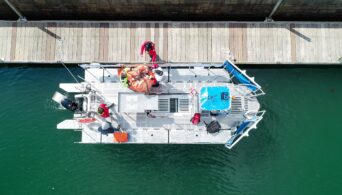Indonesia: Whale strandings on the Balinese coasts are increasing
Indonesia
Mobula
14 April 2023
Since April 1st, several sperm whales and cetaceans have stranded in Indonesia. A look back at this series of tragic events in one of the main countries victims of ocean plastic pollution.

Black series for the Balinese whales...
Wednesday, April 5: An 18-meter-long male sperm whale washed up on a beach in the Klungkung district on the east coast of Bali. The inhabitants and local authorities pushed the dying animal back into the sea, but it was found dead on another beach a few hours later. Animal experts are now preparing to autopsy the sperm whale to determine the cause of its death. The results will be communicated in approximately three weeks.
Saturday, April 8: Another 17-meter long male sperm whale was discovered washed up on Yeh Leh beach, in the Jembrana district, west of Bali. Permana Yudiarso, local fisheries and marine official, explained that the team in charge was trying to tow the carcass to the shore to facilitate the autopsy, before proceeding with the burial once it was completed. Here again, the analysis of the necropsy results is ongoing.
This is the third whale to be stranded in Bali since the beginning of April! On April 1, a Bryde’s whale weighing more than two tonnes and measuring at least 11 metres in length was found stranded on a beach in Tabanan.
The question haunts all minds: what phenomenon is at the origin of this black series? And, without prejudging the results of the analyses, all eyes are focused on one of the recurrent environmental scourges of the Indonesian archipelago: plastic pollution.
“We are still looking for the cause of his death. We want a scientific explanation, to know if pollution or plastic (waste) is the cause.”

Plastic pollution, a major environmental crisis
If plastic is on the list of suspects in the deaths of these three large cetaceans, it is because the stranding of whales in Indonesia, and more broadly in Southeast Asia, is not an isolated event.
In 2018, a sperm whale had already been found dead in Bali with a hundred cups and twenty plastic bags in its stomach, overwhelming evidence of the seriousness of plastic pollution affecting Indonesian waters.
In 2019, it was 40 kilos of plastic that was found in the stomach of a beached whale in the Philippines. Plastic shopping bags and packaging prevented it from feeding and the animal died of starvation. Over the past 10 years, no less than 61 whales and dolphins have fallen victim to pollution dumped in the Indian Ocean, the Java Sea and the Philippine Sea.
For several years, Indonesia has been regularly among the 10 countries considered to contribute the most to global ocean plastic pollution (see our article on this subject). This is due to a high demand for (over)packaged products in this densely populated country, combined with a nascent waste management system and an island geography that complicates waste collection and treatment. These three factors explain why plastic pollution has become, over the years, a major environmental issue in Bali and in the whole Indonesian archipelago, to the point that the government has made it a priority and set up an ambitious multi-year national strategy, aiming at reducing plastic pollution by 70% by 2025.
Solutions to clean up the most impacted areas

Recent tragedies on the beaches of Bali underscore the critical importance of addressing plastic pollution in the oceans. Plastic waste that ends up in the water can cause irreparable damage to marine life, including the largest mammals such as sperm whales.
It is to preserve a remarkable marine biodiversity and a magnificent aquatic ecosystem, between coral belt and volcanic islands, that The SeaCleaners has implanted the Mobula 8 in Bali since 2022. This versatile and innovative cleanup boat is designed for calm waters and is part of a global program to fight plastic pollution: the MAPP program (Mobula Against Plastic Pollution).
In partnership with local authorities, associations and entrepreneurs, The SeaCleaners is implementing a comprehensive program to fight plastic pollution: waste collection and management, awareness and training of local communities, technical assistance to improve the value chain, and scientific research. This program complements the curative action of the Mobula 8 vessel.
This ambitious project aims to clean up the most polluted areas of the ocean around Bali using innovative technologies. By working to reduce plastic pollution in the oceans, The SeaCleaners hopes to preserve marine life and protect ecosystems for future generations.
Sources
- Massive sperm whale beaches itself, dies in Bali
- Pollution des océans : une baleine a agonisé avec 40 kilos de plastique dans le ventre
- Cette baleine est morte après avoir ingéré plus de 9 kilos de plastique
This handout picture taken on April 8, 2023 by The Regional Office for Marine and Coastal Resources Management Denpasar, and released through the courtesy of the Indonesian Ministry of Marine Affairs and Fisheries, shows a dead whale stranded on a beach in Jembrana, in Indonesia’s resort island of Bali. (Photo by Handout / various sources / AFP)
